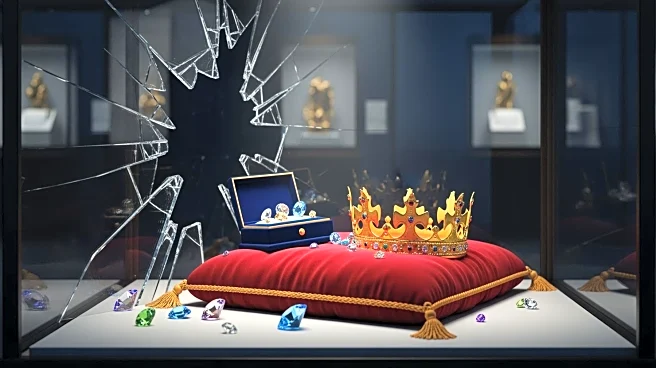What's Happening?
In a daring daylight heist, thieves targeted the Louvre Museum in Paris, stealing several priceless French crown jewels. The robbery occurred on Sunday morning, with the perpetrators taking only seven
minutes to execute their plan. They managed to steal eight items of significant cultural heritage from the Apollo Gallery, including an emerald-and-diamond necklace gifted by Napoleon to Empress Marie Louise and the 19th-century crown of Empress Eugenie. The thieves used angle grinders to break into high-security display cases and threatened museum guards during the raid. Despite the theft, the crown of Empress Eugenie was recovered after being dropped by the thieves during their escape. The Louvre has been closed to preserve evidence for the ongoing investigation, which involves a team of 60 investigators.
Why It's Important?
The theft of the French crown jewels from the Louvre Museum highlights vulnerabilities in the security of cultural institutions. As the world's most-visited museum, the Louvre's security measures are under scrutiny, especially given its historical significance and the value of the stolen items. The incident has sparked outrage among French politicians, with calls for enhanced protection of national treasures. The theft not only represents a significant cultural loss but also poses challenges for law enforcement in recovering the stolen items and preventing future incidents. The heist underscores the need for improved security protocols in museums to safeguard invaluable artifacts.
What's Next?
The investigation into the Louvre heist is ongoing, with authorities searching for the team of four thieves responsible. The French government is likely to review and strengthen security measures at cultural institutions nationwide. The incident may prompt discussions on the allocation of resources for museum security and the implementation of advanced technologies to prevent similar thefts. Public and political pressure may lead to swift action to ensure the protection of France's cultural heritage. The Louvre's management and French officials are expected to collaborate on strategies to enhance security and prevent future breaches.
Beyond the Headlines
The theft at the Louvre raises ethical questions about the protection of cultural heritage and the responsibilities of museums in safeguarding historical artifacts. It also highlights the potential for international collaboration in recovering stolen items, as such treasures often surface in global black markets. The incident may lead to increased awareness and advocacy for cultural preservation, emphasizing the importance of protecting historical artifacts for future generations. Additionally, the heist could influence museum security practices worldwide, prompting institutions to reassess their vulnerabilities and adopt more robust security measures.










